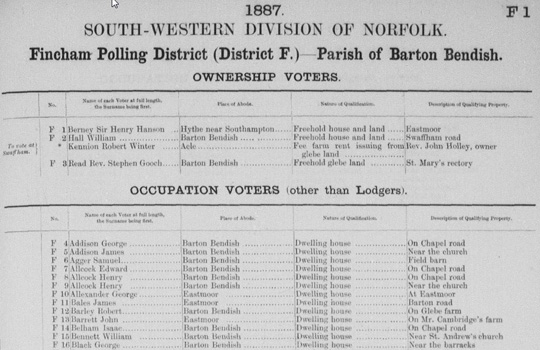• Since electoral rolls show all eligible adult voters in a household, it is possible to establish a migration pattern for a family by looking at multiple electoral rolls over many years. In particular, electoral rolls will tell you when various family members left the region by their absence on successive voter lists.
• For common surnames, electoral rolls can provide an additional bit of evidence that can help trace an ancestor because the surname is tied to a particular address.
• A poll book is different from an electoral roll. In most jurisdictions, poll books predate electoral rolls. Basically, a poll book is a list of people who actually voted. In addition to showing how the person voted, a poll book lists the address of the person and their qualification for voting. In the UK, poll books go back as far as the late 1600s. Early poll books are rare.
• It is important to distinguish a poll book (used mainly in Commonwealth countries) with a polling book, which is a term sometimes used in the US to refer to electoral rolls.
• A burgess roll is a term used in the UK for an electoral roll created for a local government election.
• In many jurisdictions, the voting eligibility rules for someone who lived in the country were often different (and more stringent) from the city. Thus, someone who might not be eligible to vote in the country could move to the city and become eligible to vote. Therefore, always check electoral rolls if an ancestor moved from the country to a city.
• In many jurisdictions, electoral rolls were also used to select people for jury duty. Thus, if your ancestor appears on an early electoral roll, it is possible that a local court record may also exist if your ancestor served on a jury.
• Electoral rolls were initially created to reduce the incidence of electoral fraud. (see A Date Guide to English Genealogy).
Shortcomings of Historic Electoral Rolls
There are several shortcomings of electoral rolls that are important to understand if you want to get the most out of this resource:
• Electoral rolls were compiled and organized by each polling district. The compiled list was usually kept in the region in case an election was held. Thus, in most countries (particularly the US and Canada) there is no central repository for historic electoral rolls that can be easily accessed.
• Electoral rolls were never meant to serve as a long-term permanent record like a birth record or a marriage record. In many jurisdictions, old electoral rolls were often discarded once a new electoral roll was produced. This is particularly true in the US and Canada. Fortunately, many of the electoral rolls in some jurisdictions (such as the UK) have survived because often three registers were needed to be kept for each district: the current register; a register of names to be added and a register of names to be deleted.
• The historic electoral rolls that have survived in the US and Canada are often stored in local and regional libraries. State libraries are the best place to look in the UK, Australia and New Zealand.

• Most electoral rolls do not have an index of the names of the voters. Instead, most electoral registers are organized by polling station. Each polling station then lists voters either alphabetically by surname or by street address. Therefore, it helps to know the approximate residence of your ancestor. One useful shortcut is to use the last known address of your ancestor from another historic record (such as a census record).

